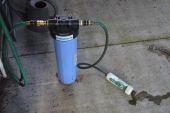Hey Jennifer
My sympathies with this problem. It is not an easy one. This is really something that the pollutor should deal with but if your garden is under threat....
Could you give some extra information ?
It is migrating slowly through the subsoil
How deep ? Is the polluted groundwater in use for irrigation or is it a problem for plant roots ?
How big and how concentrated is this chloride plume ? Is it just chloride ? How fast will the chloride plume reach your property ?
I can imagine that sulfates etc.... are up as well. Is the water unsafe and/or unusable ? Chloride is very soluble and has the potential to migrate away from its source. Others pollutants may also have been released and move more slowly. The other pollutants - if present - may be more of a problem.
For instance, chlorine when exposed to the sunlight will dissipate. Would that happen to chloride? the difference between the two substances is an extra electron. Could you pump up water from the aquafer into a shallow pool and allow the chloride to evaporate and then reintroduce it to the aquafer?
No, chloride - evaporation is not an option - Salt pans do actually the reverse - In a salt pan, the water evaporates and the salts kristalise and can be harvested.
https://en.wikipedia.org/wiki/Salt_pan_(geology)
https://en.wikipedia.org/wiki/Salt_evaporation_pond
Groundwaterpollution of this type is difficult to clean up. Chloride will not degrade (biologically or chemically) spontaneously. Active chemical remediation can work but is not cost-effective for large areas or for private individuals. Environmentaly this kind of remediation is also a CO2-producing mess. Most chemicals which you could theoretically use are energy intense to produce and they are not specific. Meaning they may react with other soil components you don't want to loose.
Pumping it up is possible but once up, chloride will not evaporate. Chemical treatment is possible but is usually expensive. Most cases i know of are left to dilute spontaneously after the source has been dealt with.
I doubt very much that much can be done other than containment or placing some kind of reactive wall. Containment works by placing a barrier in the way of the groundwatermovement to prevent the pollution reaching a vulnerable area. It can also be a pumping action to change the flows rate or direction. Containment works best when you can lock the pollutant in. It is difficult to lock the pollutant out.
A reactive wall is a permeable barrier that either absorbs the pollutant or changes it into something harmless.
Peat has interesting properties regarding chloride. So if you have easy access to peat or something similar you may experiment with it.
Peat when flooded with seawater retains salt. That is why during the middle ages salt was extracted from salty peat by boiling.
https://nl.wikipedia.org/wiki/Moernering This wiki is not linked to an English equivalent but since it was done in England as well, i suppose there must be one somewhere. This link illustrates the point
http://www.nihk.de/index.php?id=2297 You must check if it is effective enough to make a difference - i don't have a clou.
There are plants and plant varieties that can cope with some salt in the groundwater but there are none that i know of that effectively remove salt from the soil or the groundwater. There are usefull plants grown in salty conditions but not much. Check Israeli research institutions for more details.
When you cannot keep the salt groundwater from reaching your garden you may loose lots of plants. Possibly your garden may survive if the salt groundwater is deep enough and you don't use it for irrigation.
If you irrigate with groundwater check the construction of your well. Salt groundwater is heavier than fresh water. Salt water might use the disturbed zone around the well as a conduit to contaminate deep fresh water aquifers (eg under a clay layer). This is usually prevented by sealing the well with bentonite.
If you irrigate from a fresh water layer atop of the salt water layer, do not pump fast or to much because this will encourage mixing of the groundwater layers.
Good luck
Erwin

















 1
1
















